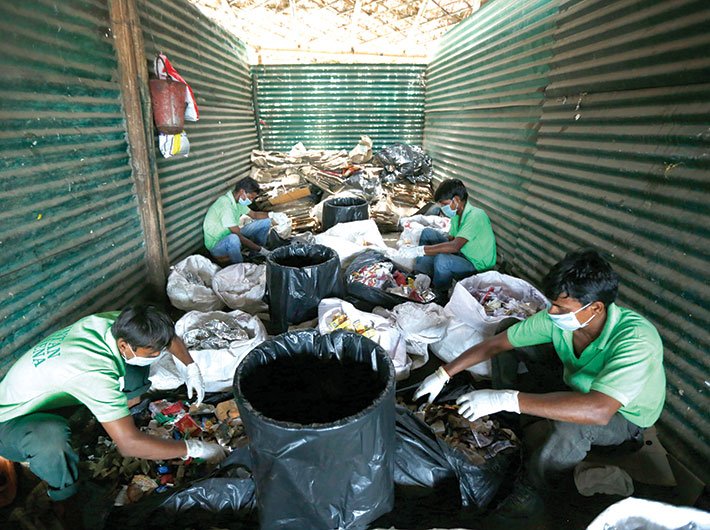At half a million, the number of travellers who use the New Delhi railway station every day is larger than the population of most cities. Imagine the waste they leave behind, from water bottles to leftover food and much more. It would form a sizeable dump. Yet, surprisingly, the station appears cleaner these days.
NGO Chintan in collaboration with Safai Sena, a waste-picker’s organisation, has been cleaning the railway station since 2011 and keeping it largely spick and span. Workers of the Safai Sena collect plastic bottles and catering waste generated in Rajdhani and Shatabdi trains after the passengers deboard and also the waste from the bins in the platforms. The waste is then taken to the material recovery facility (MRF), situated beyond platform number 16, for segregation. The facility stands on a former garbage dump, which has been transformed into a dignified and clean working space.
The MRF has two makeshift facilities. In one facility, waste is segregated into dry and wet waste. Dry waste is further segregated into plastic bottles and papers. Wet waste – mostly vegetables, cooked food waste and fruits – is taken to the other facility for composting.
Chintan appointed supervisors are present on the platforms all the time to ensure swift recovery of all waste. Seventy workers work round the clock in eight-hour shifts in the facility. The peak working hours are 10 am to 1.30 pm and 9.30 pm to 2 am.
At the segregation unit, the top end of the plastic bottles is sheared off below the cap which is separately sent for recycling. The rest of the bottle is shredded to avoid misuse and sold for recycling. Similarly, paper and other recyclable materials are sold off. The aim of the MRF is to ensure that very little waste reaches the landfills.
Some of the waste is not recycled. Multi-layered packaging has no recyclable value, neither do non-biodegradable materials like thermocol and sanitary napkins, says Chitra Mukherjee, manager, advocacy and outreach, Chintan. “We have been advocating for the producers to take responsibility of the non-recyclable materials. They should either take back their non-recyclable packaging or employ research to manufacture recyclable materials.” All non-recyclable materials reach the landfill and they poison the ground water. “The areas in and around landfills have extremely poisoned ground water.”
Balmukund, a supervisor of the MRF, says their work is not without danger. “Many a time workers have to fight it out with urchins and drug users who too collect plastic bottles from railway coaches. As our men are present in more numbers, they usually drive them away.”
All workers receive wages above the minimum wage requirement and have a yearly health insurance up to '30,000. Lakshman Singh, 60, has been working with Safai Sena for five years and receives '12,000 monthly whereas Anil Kumar, in his twenties and working since last year, receives '8,000 a month. The cost of maintaining the facility including electricity bills, transporting the waste and salary of workers is met by the activities of the facility itself. Plastic bottles are sent to recycling units in Mandoli, Narela, Bawana in Delhi and sometimes in Uttar Pradesh. Recyclers are also part of the Safai Sena. Initially, plastic waste was sent to China. “Under the guidelines issued by the NDA government we can no longer send the waste to China. As a result the price per kg has fallen drastically,” says Jai Prakash Choudhary, secretary, Safai Sena. The compost, for the time being, is given to the railways for free.
The tender for cleaning the tracks has been given to a private company. “Railway tracks generate a lot of sludge and non-recyclable materials. Safai Sena collects only recyclable items,” says Mukherjee.
In 2014, the MRF won the Deutsche Bank Urban Age Award, presented to the best urban initiatives in various cities across the world. The past winners include projects in Istanbul, Mexico City, Cape Town, Rio de Janerio, Sao Paulo and Mumbai. The jury noted that the project emphasised the importance of more sustainable cycles of consumption and production. Proper management and a systematic process has also lead to more dignified livelihoods for the otherwise marginalised ragpicker’s community, they added.
The other railway stations of Delhi are not big enough to require an MRF. However, Chintan is planning to do whatever it can to help keep them clean.
puja@governancenow.com
(The story appears in the September 1-15, 2015 issue)

